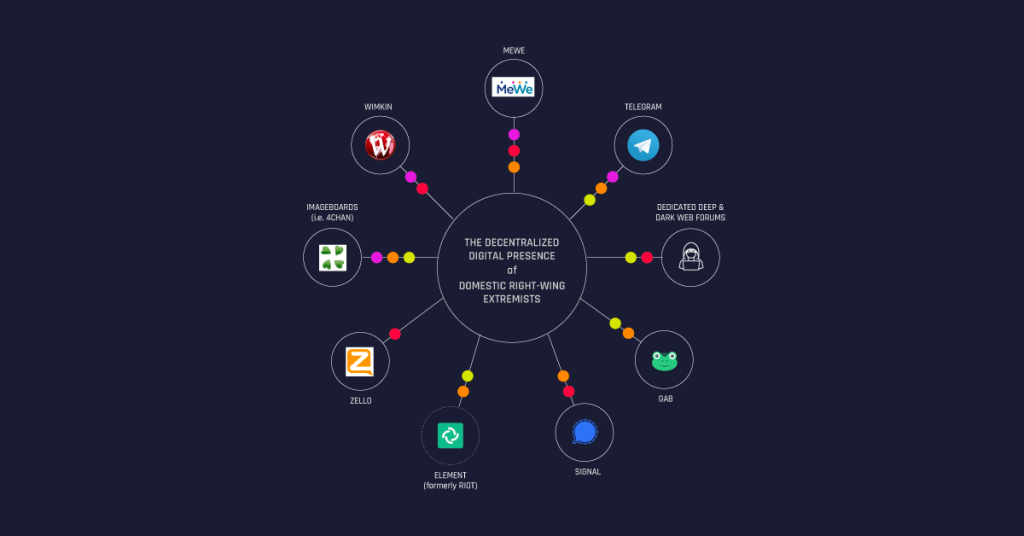Blog
Following the Domestic Extremist Threat: Digital Deplatforming in Inauguration Leadup
In the aftermath of the violent riot in Washington D.C. on January 6th, Parler—the self-proclaimed “free speech” platform with over 12 million registered users—went offline after Amazon, Apple, and Google terminated Parler’s access from their web services and app stores.

Parler Shuts Down, Right-Wing Extremists Flock to Disparate Channels
In the aftermath of the violent riot in Washington D.C. on January 6th, Parler—the self-proclaimed “free speech” platform with over 12 million registered users—went offline after Amazon, Apple, and Google terminated Parler’s access from their web services and app stores.
In the wake of Parler going offline, various domestic right-wing extremists have sought out alternative digital communications platforms. To date, only some of these alternative platforms have taken their own measures to remove or even curtail hate speech and threats of violence.
Precedent Dictates This Deplatforming Jumble is Only Temporary
Although domestic extremist networks and operations were disrupted by these actions, precedent shows that deplatforming alone does not generally destroy user communities, but rather simply pushes them towards other alternative platforms that may be more resistant to collapse.
This phenomenon has been demonstrated repeatedly by foreign terrorist organizations like Al-Qaida and ISIS, whose operatives and supporters have been kicked off an endless array of online platforms—including web forums, major social media sites. For instance, we continue to see Jihadists thrive on Telegram even as takedown efforts have ebbed and flowed in recent years. Each time the extremist group is deplatformed, they simply move shop and proliferate in new dark corners of the Internet. As long as the loyal userbase itself continues to exist, they will eventually find new means of communication and collaboration.
Parler Alternatives: Where Users are Heading
Domestic extremist networks are hardly without alternatives in the wake of Parler’s demise. The digital platform landscape was decentralized long before Parler was deplatformed. Sadly, there’s a diverse array of extremist communities on these channels, consisting of anti-government militias, far-right extremists, QAnon followers, and the Boogaloo movement, among others.
While this should not be considered an exhaustive list, Flashpoint analysts are tracking domestic right-wing extremist activity growing on the following platforms (ordered alphabetically):
- 4chan, 8kun, and other imageboards: Websites where users can anonymously post images relating to a particular issue or topic and anonymously reply to other users’ postings.
- Deep and dark web forums: Online discussion forums that allow illicit actors to create new message threads and receive replies posted from other users.
- Element [formerly Riot]: A Slack-like open-source instant messaging application supporting end-to-end encryption and file sharing.
- Gab: A Twitter-like social media network that is run by administrators who specifically cater their platform to far-right extremists.
- MeWe: A social media network often compared to Facebook that focuses on data privacy and engages only in limited moderation of provocative content.
- Signal: A cross-platform encrypted messaging service run by an Australian non-profit organization dedicated to developing open-source privacy technology and promoting free expression.
- Telegram: A free cloud-based chat application that offers built-in end-to-end encrypted video calling, file sharing, and other advanced features.
- Wimkin: A social media network often compared to Facebook that engages only in limited moderation of provocative content.
- Zello: A free mobile application that emulates push-to-talk (PTT) walkie-talkie functionality over cell phone networks, including group chats.
Figure 1: The Decentralized Digital Presence of Domestic Right-Wing Extremists

What’s Next
There are a number of key developments that observers will be watching closely in the coming weeks—not the least of which is whether Parler will be able to resurrect itself with a new hosting provider or if it is really permanently offline.
Another critical factor is the degree to which administrators on key alternative platforms that are *not* run by like-minded fellow travelers on the far-right will crack down on such activity—similar to what has taken place with Al-Qaida and ISIS online chatrooms. If Telegram, for example, ramps up their ongoing efforts to kick off extremists of all types (as they have already done with ISIS), domestic extremists and their supporters will be squeezed onto platforms that are mostly buggy, unreliable, and unstable.
At least in the short term, they still have the means to network and communicate, but it may be crude and slow, and there will be significant questions about data privacy and security. Unfortunately, however, in the longer term—given the case of foreign terrorist organizations like ISIS—deplatforming off Telegram has also led to critical technical innovations and has pushed extremists to create their own proprietary Slack-like chat servers. It remains to be seen if domestic terrorists can or will follow this same path.
Contact Flashpoint for More Information
Please contact Flashpoint to activate your 90-day free trial in minutes. See how we’re supporting private and public sector organizations like yours, and how Flashpoint actionable intelligence will help you achieve your missions today.